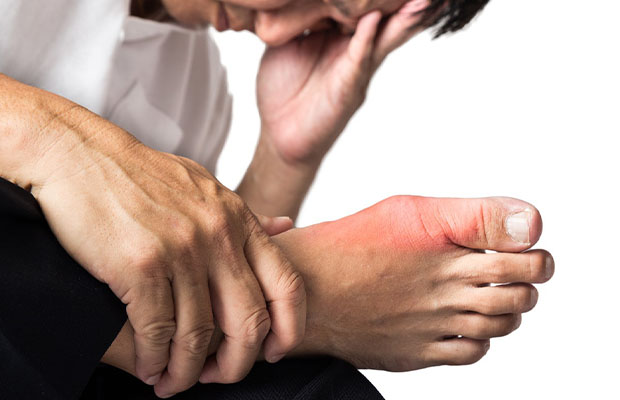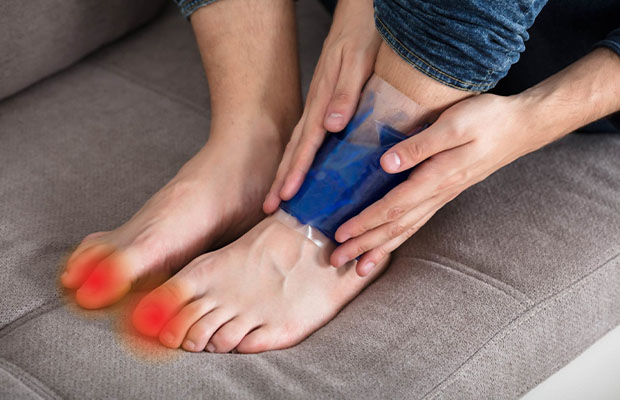How to Stop Gout Pain at Night? Cause & Treatment

Do you knwo how to stop gout pain at night? You can take general anti-inflammatory pain relief medications to help control gout. Steroids and nonsteroidal anti-inflammatory drugs (NSAIDs) may be used in treatment.
Gout is an inflammatory condition that is very common in the UK. The resulting pain and swelling can make it challenging for you to carry out daily tasks or pay attention to work or leisure activities because the pain can be very distracting.
The best place to begin managing gout is by learning how to prevent and treat it. To learn more, continue reading.
Table of Contents
Causes
Gout is prevalent in post-menopausal women and older men, and it may also run in the family in some cases.
However, there are external factors that you can control, which play their part in causing gout:
- prescribed drugs, such as aspirin and water pills;
- Existing circumstances, like rheumatoid arthritis;
- Heavy alcohol consumption;
- High purine diet e.g. organ meats and red meat;
- Sugar sweetened soft drinks;
- Even fruit and fruit juice raise the risk of gout in those who already have it.
Why Does My Gout Hurt More at Night?
Gout attacks were 2.4 times more common at night and in the early morning, according to a study in Arthritis Rheumatology. A gout attack’s pain and swelling may last for a few days to a few weeks, making it difficult to fall asleep.
Researchers think that people are more prone to gout attacks during the night for several reasons, including:
- A drop in body temperature: While you sleep, your body temperature drops just enough to encourage the formation of uric acid crystals in your joints, which can lead to a gout attack.
- Breathing rates change while you sleep because your lungs don’t release as much carbon dioxide, which raises blood acidity and stimulates the production of uric acid.
- You have sleep apnea: In comparison to people without it, those with sleep apnea have a 1.86 times higher risk of developing gout.
How Can I Sleep Comfortably With Gout?
You can manage gout by taking over-the-counter anti-inflammatory painkillers. Nonsteroidal anti-inflammatory drugs (NSAIDs) and steroids may be used in treatment.
You can also use a cold compress to ease your pain by reducing the swelling and inflammation. Most pharmacies sell cold packs, but you can also use frozen water that you’ve wrapped in a facecloth or tea towel and placed under the painful joint.
Pain Relief Without Medicine
Use cold. Try applying cold compresses or packs to the joint if your pain isn’t too severe to reduce inflammation and relieve the discomfort. Apply ice to the joint for up to 20 minutes, several times per day, wrapped in a thin towel. If you have nerve issues caused by diabetes or other conditions, avoid icing your hands or feet.

Rest the joint. Resting it until the pain subsides is a good idea. In any case, you won’t want to move it very much. Raise the joint on a pillow or other soft object, if you can.
Drink water. Your body produces more uric acid when it is dehydrated. To help keep those levels normal, drink plenty of water.
Be mindful of your diet and hydration. Foods high in purines, such as some types of seafood, organ meats like liver, and fatty foods, can increase the level of uric acid in your blood even further. Alcohol, particularly beer, as well as beverages with fructose as a sweetener.
Does Gout Go Away Overnight?
Resting is one of the best things you can do if you are going through a gout flare. Gout pain can also be relieved overnight by taking anti-inflammatory medications just before bed.
By avoiding caffeine in the late afternoon and allowing yourself time to unwind and relax before bed, you can create a good sleep environment. To lessen the burden and pressure on your painful toe, sleep with light sheets over your feet rather than a heavy duvet or blanket.
Prevention
Knowing what relieves gout pain is as useful as understanding how to prevent it. A healthy lifestyle, balanced diet and regular exercise minimizes a variety of health problems but will help get rid of gout.
High levels of uric acid in the blood result in the disease gout. This can be aggravated by kidney disease or other medication. You might need to have it reviewed, and you might also need to take medication to manage your uric acid level and stop attacks.
When to Get Help for a Gout Flare
Informing your physician that you are experiencing a flare-up is always a good idea. If your symptoms don’t go away or if your treatment plan isn’t working, you might need to follow up. Call your doctor if:
This is your first flare-up. Some of the symptoms of gout attacks can also be found in a number of other conditions, such as a joint infection.
You have a highfever and chills. A slight fever may be one of the signs of a gout attack, but a higher temperature might indicate an infection.
Your symptoms don’t get any better after 48 hours or don’t end after about a week. Call your doctor if, after a few days, you still don’t feel somewhat better. They might recommend an alternative therapy. Even without treatment, the majority of gout attacks will go away on their own in a few weeks.
Read More: How To Use Epsom Salt For Ingrown Toenail?
Tags: Stop Gout Pain